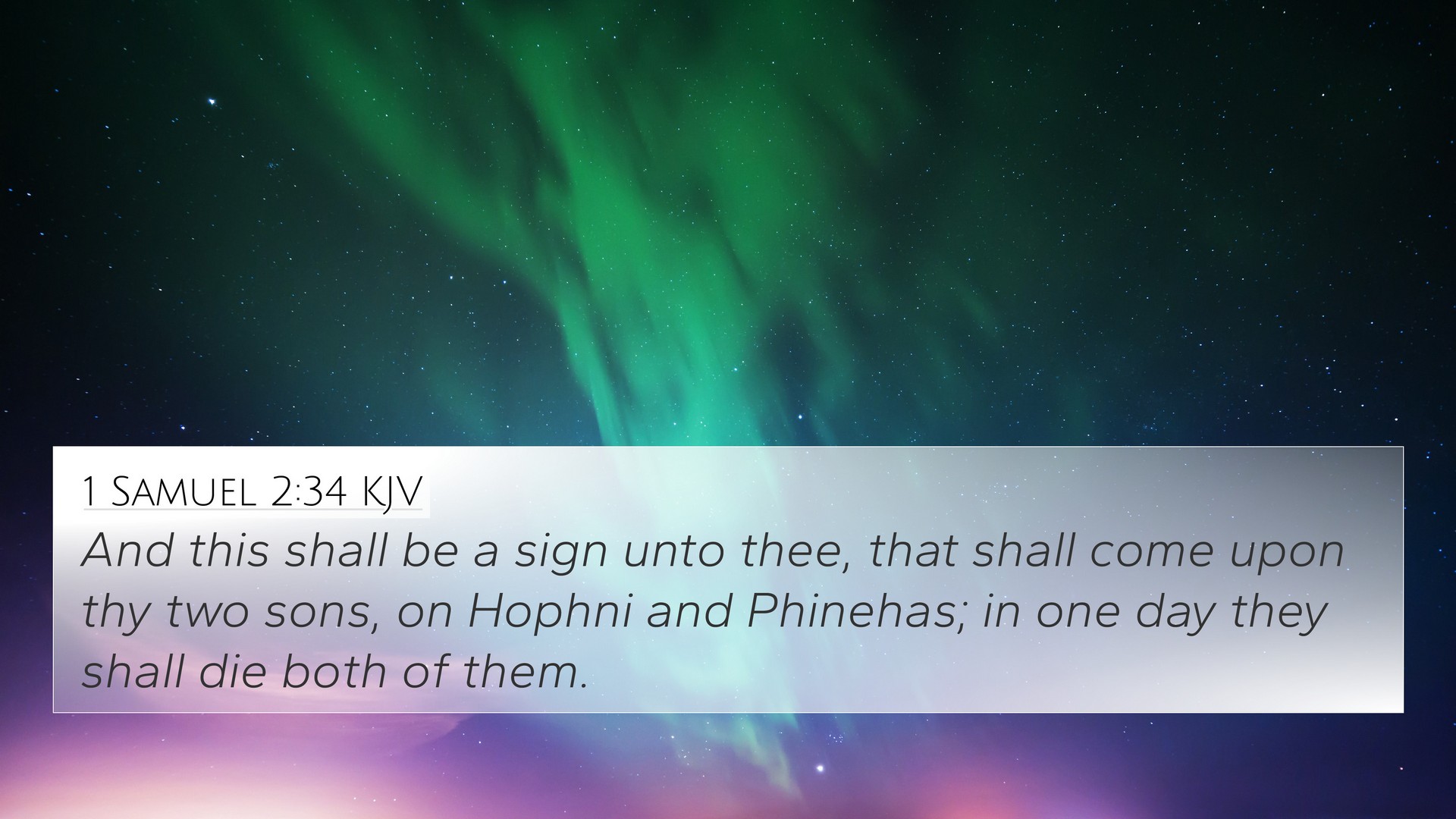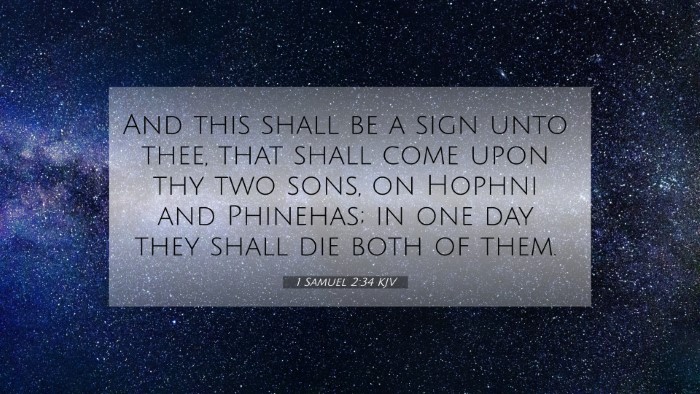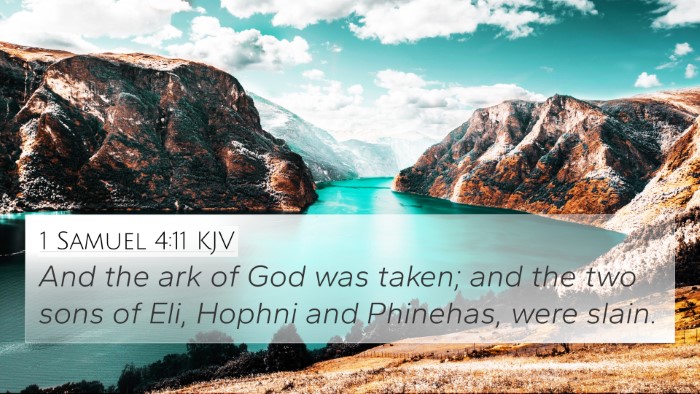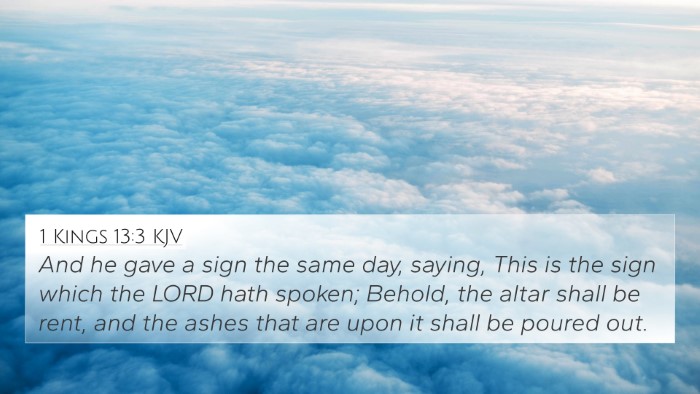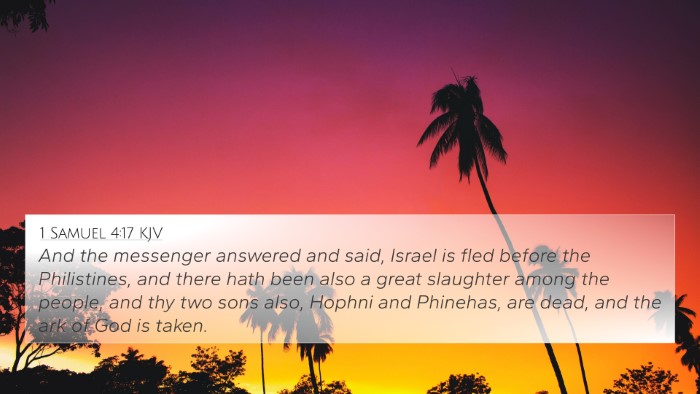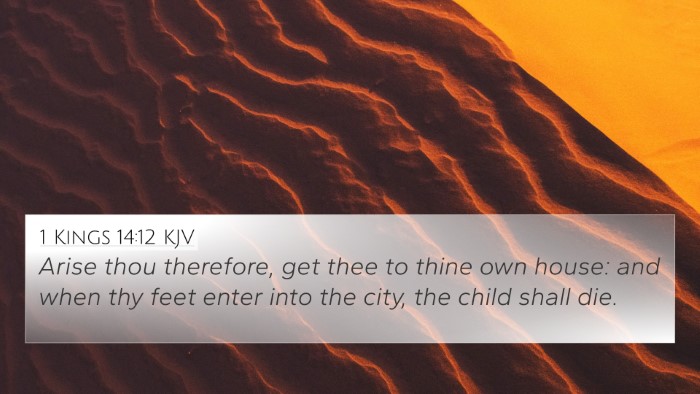Understanding 1 Samuel 2:34
Verse Reference: 1 Samuel 2:34 - "And this shall be a sign unto thee, that shall come upon thy two sons, Hophni and Phinehas; in one day they shall die both of them."
Contextual Overview
The passage in 1 Samuel 2:34 is a significant pronouncement and serves as a somber warning regarding the fate of Eli's sons, Hophni and Phinehas. This verse is part of a larger narrative that speaks to the consequences of corruption and the failure of spiritual leaders to uphold their responsibilities.
Commentary Insights
- Matthew Henry: Henry emphasizes that this pronouncement is a divine declaration of judgment. The death of Eli’s wayward sons serves as a cautionary tale about the gravity of dishonoring God, particularly for those in positions of authority.
- Albert Barnes: Barnes notes the prophetic nature of this sign. Both sons' deaths signal a divine response to their iniquities, illustrating how God addresses sin directly. This event was a pivotal moment in the history of Israel, leading to significant changes in the priesthood.
- Adam Clarke: Clarke elaborates on the implications of this prophecy. He points out that the swift and simultaneous death of Hophni and Phinehas underlines the seriousness with which God treats the Covenant and His will, demonstrating the swift judgment that can follow persistent disobedience.
Thematic Connections
This verse not only serves its immediate context but also connects thematically across Scripture. Below we will explore related Bible verses that echo similar themes of judgment, disobedience, and divine intervention:
- 1 Samuel 4:11: "And the Ark of God was taken; and the two sons of Eli, Hophni and Phinehas, were slain." - Foretells the outcome of their lives as prophecies of judgment come to fruition.
- Numbers 3:4: "And Nadab and Abihu died before the LORD, when they offered strange fire before the LORD." - Another example of divine judgment against inappropriate worship by priests.
- Hebrews 10:31: "It is a fearful thing to fall into the hands of the living God." - Reflects the seriousness of God's judgment towards sin.
- Jeremiah 7:12-14: Discusses the destruction of Shiloh, the former place of worship, highlights the repercussions of disobedience.
- Revelation 2:5: "Remember therefore from whence thou art fallen, and repent, and do the first works; or else I will come unto thee quickly, and will remove thy candlestick out of his place, except thou repent." - Jesus’s call for repentance draws parallels to the necessity of returning to justice and righteousness.
- Proverbs 11:21: "Though hand join in hand, the wicked shall not be unpunished: but the seed of the righteous shall be delivered." - This verse informs the principle that evil acts lead to certain consequences, resonating with the judgment faced by Eli's sons.
- Romans 6:23: "For the wages of sin is death; but the gift of God is eternal life through Jesus Christ our Lord." - This reinforces the biblical theme of sin leading to death, as seen in the fate of Hophni and Phinehas.
Interpretative Analysis
This verse serves a dual purpose: it is both a warning and a confirmation of God's justice. The deaths of Hophni and Phinehas are not arbitrary; they are justified outcomes of their actions. The implications of this are relevant for both the historical context of ancient Israel and contemporary applications regarding leadership and faithfulness to God's commandments.
Lessons and Applications
Readers can draw significant lessons from this account:
- Accountability: Leaders, particularly in spiritual contexts, are held to higher standards of behavior and integrity.
- Consequences of Sin: The narrative stresses that disobedience to God, especially by those who are entrusted with spiritual leadership, leads to severe consequences.
- Divine Judgment: God’s judgment is certain, and His timing may differ from human expectations but always reflects His righteousness.
Cross-Referencing Biblical Texts
Utilizing a tool for bible cross-referencing can enhance one's understanding of how various scripture passages echo or illuminate one another. The connections between Bible verses (like those mentioned above) provide a more comprehensive grasp of biblical themes and offer insight into God’s character and expectations.
Conclusion
1 Samuel 2:34 stands as a powerful reminder of the serious nature of our commitments to God. The interconnectedness of this verse with others reveals a profound message about accountability, judgment, and divine governance. Understanding the implications of such biblical passages deepens our faith and provides a template for examining our lives in light of God's word.
